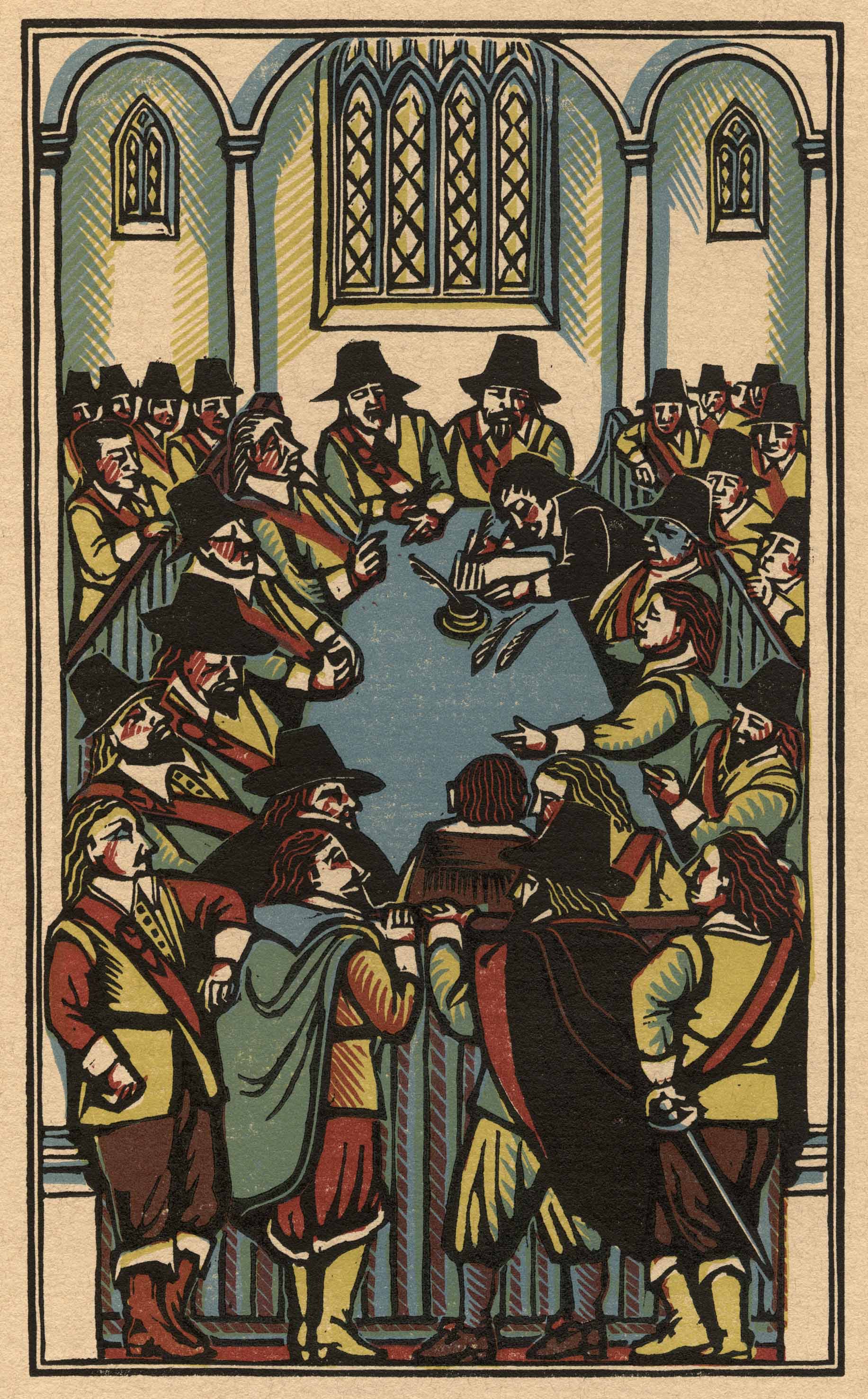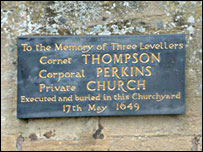Democrat May-June 2008 - Roots of Democracy
The Levellers
During the first English Civil war in 1645 a political party was formed nicknamed the Levellers. They believed the law should equally protect the poor and wealthy. This party largely arose out of discussions in the New Model Army on soldiers’ rights. Pamphlets were written by radicals including John Lilburne a former Lieutenant Colonel in the Parliamentary Army. They drew attention to the fact that soldiers were part of Parliament’s forces but few could vote for MPs. They were fighting the Royalists under King Charles I who considered he ruled by divine right. The Levellers and many others believed that each man should have freedom limited only by regard for the freedom of others.

After the end of the first Civil War the Putney Debates took place in 1647. Leveller supporters were elected from each regiment to attend the debates chaired by Oliver Cromwell to discuss the political situation of the day. To the surprise of the ‘Grandee’ senior officers the Levellers tabled a constitutional proposal known as ‘An Agreement of the People’.
The Agreement proposed a written constitution to define England’s government, abolish arbitrary power, set limits to authority, and remove grievances. All Leveller soldiers carried this agreement proudly tucked into their hat-band and they were the majority in many regiments.
Henry Ireton a senior officer and Cromwell’s son-in-law, opposed universal suffrage. In support of the Levellers was Colonel Thomas Rainborough from a foot regiment and formerly vice admiral of the fleet. Consensus was reached during the Debate on granting the vote to all adult males, excepting servants, apprentices and beggars. Women were not included as they were deemed to be under the direction of their husbands.
This was seen as the time the nation became a democracy of independent men marked by the Putney Debates and thinking through democracy.
The day the Putney Debates ended King Charles escaped to the Isle of Wight and stated the Levellers intended to overthrow him. The King planned to organise action for his pro-royalist forces in Scotland. He also had supporters in Ireland and mainland continent. Cromwell had the king locked up again and simultaneously moved against growing dissent in the Army. Fairfax, commander of the New Model Army, rallied selected Leveller-influenced regiments. Cromwell rode amongst them, removed and tore up the Agreement they wore in their hats. Many Levellers were court martialed and their network of agitators broken. Despite this setback the power of Leveller ideas prevailed.
The second Civil War planned by the King began in 1648 with Scottish Royalists and uprisings in Essex which were defeated at Preston and Colchester. Presbyterian MPs, a majority in parliament, plotted the return of the King to the throne. They were kept out of Parliament by independent MPs and the Army. Parliament was then known as the Rump.
Ireton and Cromwell feared a third civil war so Ireton united with the Levellers in a revolutionary proposal the ‘Remonstrance of the Army’ to put the King on trial as the Royalist Commander. Initially there was no intention to execute the King but he showed no remorse for the ‘troubles’ and blood spilt. The High Court decided that the King be executed over which the Levellers had serious reservations. The Court also decided that the House of Commons be the sole institution of legislative power and without the need of the consent of the King or House of Lords. The Commons abolished the office of king and House of Lords and set up the Commonwealth.
The Levellers disagreed with the Commonwealth and Council of State. They correctly forecast the Council would fit the jack-boots of the Star Chamber and the Rump Parliament would not submit itself to an election.
Within the Army, war weariness and impending action against royalist forces in Ireland caused a mutiny when soldiers refused to serve in Ireland. Three hundred soldiers were locked up in Burford Church and three leaders executed. Leveller leaders were arrested and Lilburne put on trial for treason. But against the direction of the judges Lilburne was acquitted.

This trial set a precedent which established the adversarial system and where an independent jury could return a ‘not guilty’ verdict.
The Agreement and subsequent verdict of Lilburne’s trial indicate the far reaching vision of the Levellers. Some of their objectives have still not been achieved. Other Leveller objectives are now under serious threat from the wholesale attack, especially by the proposed EU Constitution, on all forms of democracy and fundamental rights.
Roots of Our Rights I and II contains a series in similar vein of historical pieces in pamphlet form and now available for £2.40 the pair post free.